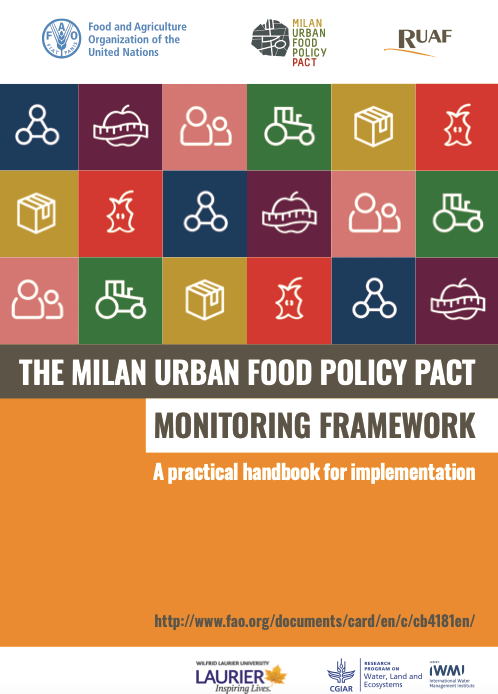New monitoring guidance offers cities resources to help build back food systems
25 August 2021
Joy Carey
RUAF, FAO, and the Milan Urban Food Policy Pact (MUFPP) Secretariat have launched the MUFPP Monitoring Framework Handbook and Resource Pack.
Currently, more than half of the world’s population lives in urban areas, mostly in highly dense cities. This figure is set to increase over the coming decades, according to the UN’s projection. While urban living can lead to multiple socio-economic benefits and opportunities, the rapid scale and pace at which this trend is happening brings enormous challenges, including environmental degradation, health hazards and social inequalities. Moreover, if not adequately managed, ongoing urbanisation will dramatically increase the pressure on waste and natural resources management, posing severe food security and safety threats.
Cities and key stakeholders play an increasingly crucial role in ensuring nutritious, affordable and safe food in urban contexts and in shaping the food environment. The Milan Urban Food Policy Pact (MUFPP), signed by 211 cities (as of July 2021) worldwide, puts forward a roadmap to develop sustainable food systems that are inclusive, fair, resilient, safe and diverse while providing healthy and affordable food to all people. The Milan Pact sets out six thematic workstreams, each with recommended actions. The purpose is to encourage policymakers and city governments to integrate sustainable urban food policies into programmes and projects.

In addition to the recommended actions, a MUFPP Monitoring Framework has been developed to help cities track their progress. This framework is based on the results and lessons learned from a seven-month project in 2019 during which three cities – Antananarivo (Madagascar), Nairobi (Kenya) and Quito (Ecuador) – piloted the implementation of the MUFPP Monitoring Framework with technical support from RUAF and The UN Food and Agriculture Organization (FAO). This Monitoring Framework was presented at the MUFPP Global meeting in Montpellier in October 2019. Linked to this work, RUAF adds a gender lens to the monitoring framework.
___________________________
“The MUFPP monitoring framework has helped show us a pathway to becoming changemakers by identifying a diverse range of food system activities that we can propose to local policymakers. It has helped inspire new collaborations as the data collection process required us to seek out other food system actors, especially those pursuing similar goals of sustainability and resilience.” – Alexandra Rodríguez Dueñas, Project Lead, AGRUPAR Participatory Urban Agriculture Project Manager, Conquito.
___________________________
In a new step towards supporting cities to customise and implement the monitoring framework, RUAF and FAO have developed The Milan Urban Food Policy Pact Monitoring Framework Handbook and Resource Pack. This new publication provides practical guidance for cities wishing to adopt and implement a monitoring framework tailored to their own context and reflecting MUFPP recommendations. It sets out practical steps, simple tools, top tips, and a methodology that cities can follow to measure progress of their own priorities. This includes establishing initial baselines against which to measure change in the future.
UN agencies, country representatives, academics, and practitioners worldwide recognise that cities and urban areas are best placed to change food systems. Therefore, it is critical that cities plan, track, and measure impacts to determine if desired changes are met and to convince partners and community members to engage. As per the spirit of the Milan Pact, the goal of the monitoring framework is to make it easier for cities to keep track of and report on yearly achievements. Furthermore, the more cities adopt this practice, the easier it is to facilitate city-to-city exchange and learning.
Developing a better understanding of the MUFPP indicators is crucial for undertaking new activities, identifying potential challenges, and monitoring progress. In addition, data collection, monitoring and evaluation offer learning opportunities to create more equitable, resilient and sustainable food systems.
___________________________
“There are bottlenecks and obstacles in the way data are collected, shared and stored across the city. However, the inter-sectoral collaboration helped to inspire solutions to improve data collection and analysis. Having indicators about food security makes work purposeful and gives it meaning. It’s an eye-opener, creates synergy and enables us to bring together a range of different perspectives to solve problems with new solutions”. – Winfred Katumo, Project Lead Nairobi City County and collaborator.
“The MUFPP monitoring pilot process helped to determine the level of priority that food has within the municipality’s agenda, which resulted in the draft of the Antananarivo Food Policy Committee, Commune Urbaine d’Antananarivo (CUA). The data collection process significantly contributed to a participatory decision-making process, through sharing of data, and the evaluation of priorities to be included in future action plans led by external actors and by the CUA initiatives,”
– Tokiana Rakotonirainy, Food Policy Officer, Cabinet of the Mayor, Urban Commune of Antananarivo.
___________________________
In the light of the current social and economic impacts caused by both the COVID-19 Pandemic and ongoing challenges caused by the climate crisis, the need for food system transformation is more urgent than ever before. We encourage more cities to use these excellent, easy to use, new resources to help build back their city – for now, and for future generations to come.
Links
About the author
Joy Carey is Senior Programme Officer at RUAF Global Partnership and an independent Sustainable Food Systems Planning consultant with a focus on cities. She has worked in sustainable food and farming with the UK and international organic and local food sectors since 1990. Joy is a founding director of Bristol Food Network, coordinator of Bristol’s food partnership, and author of ‘Who Feeds Bristol: Towards a resilient food plan’ (2011) – a city region food system assessment report that has informed RUAF’s work with FAO on City Region Food Systems (CRFS). Since 2016 she has contributed to both CRFS assessment methodology and indicators for tracking progress and to developing the MUFPP monitoring framework for cities.